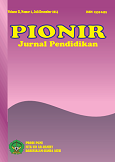META ANALISIS MODEL PBL TERHADAP KEMAMPUAN BERPIKIR KRITIS SISWA DI SD
DOI:
https://doi.org/10.22373/pjp.v9i2.8321Keywords:
Meta Analyze, Problem Based Learning, Critical Thinking SkillAbstract
The purpose of research is by to assess related to influence model Problem Based Learning (PBL) in improve critical thinking skill. Model Problem Based Learning (PBL) is one of learning model who presents the problem to solve or resolved. Research methodology used the meta research analysis. Data collection technique used is non test by means tracing articles is in online with journal used google cendekia and google schoolar. Of the results of the investigation 17 articles obtained through google cendekia. Model based on the results indicate Problem Based Learning (PBL) to increase the capacity to think critical students from 7 % to lowest highest % 29, 96 with an average % 18, 11.
References
Alita, K. U., Koeswanti, H. D., & Sri Giarti, S. (2019). Penerapan Model Problem Based Learning Untuk Meningkatkan Kemampuan Berpikir Kritis Siswa Kelas V SDN Ledok 5 Tahun Pelajaran 2018/2019. Jurnal Basicedu, 3(1)
Jacob, S. &. (2011). Measuring Critical Thinking In Problem Solving Through Online Discussion Forums In First Year University Mathematics. Proceedings Of The International Multi Conference Of Engineera And Computer Scientists,Hongkong.
Rusmono, R., & Yusro, M. (2012). Pengaruh Strategi Pembelajaran dan Kecemasan Terhadap Hasil Belajar Matematika. In Konvensi Nasional V Asosiasi Pendidikan Teknologi dan Kejuruan Indonesia 2010. Ganesha University of Education.
Utami, N. B., Kristin, F., & Anugraheni, I. (2019). Application Of Problem Based Learning Learning Models To Improve Mathematical Learning Results And Critical Students. Pionir: Jurnal Pendidikan, 8(1).
Wulandari, W dan Wahyudi. (2020). Efektivitas Model Pembelajaran Problem Solving dan Problem Posing Ditinjau dari Kemampuan Berpikir Kritis Matematika Siswa Kelas 4. Jurnal Sekolah Dasar, 5(01), 1-10.
Yaumi, Muhammad. (2012). Pembelajaran Berbasis Multiple Intellegences. Jakarta: Dian
Downloads
Published
Issue
Section
License
- Authors retain copyright and grant the journal right of first publication with the work simultaneously licensed under a Creative Commons Attribution License that allows others to share the work with an acknowledgment of the work's authorship and initial publication in this journal.
- Authors are able to enter into separate, additional contractual arrangements for the non-exclusive distribution of the journal's published version of the work (e.g., post it to an institutional repository or publish it in a book), with an acknowledgment of its initial publication in this journal.
- Authors are permitted and encouraged to post their work online (e.g., in institutional repositories or on their website) prior to and during the submission process, as it can lead to productive exchanges, as well as earlier and greater citation of published work (See The Effect of Open Access).

